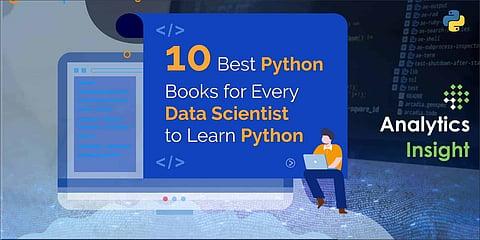
- Insights
- Cryptocurrencies
- Stocks
- White Papers
- Industry
- Geography
- Insights
- Cryptocurrencies
- Stocks
- White Papers
- Industry
- Geography


Python is one of the most popular and analytics favourite programming language that has replaced many programming languages. Python has grown its popularity by almost 20.3% in the last 5 years on the PopularitY of Programming Language index. It is best known for its easy readability, sea of libraries and great design principles.
Being a server-side programming language, it is used by data science, machine learning career aspirants. Globally Python is adopted by global bigwigs which include Instagram, Netflix, Uber, Spotify, Reddit, Dropbox, Quora, Facebook whose websites are running on this dynamic programming language.
Here are the 10 Best Python Books that make learning python career rewarding for every data science professional–
Clocking in at 2109 pages, learning Python is best to learn coding interactively. The book covers most of the Python knowledge required for getting starting and having some idea of what is going on. Altogether, a fantastic book for learning to program in Python or learning to program in general. It's lengthy, and somewhat repetitive, which helps to reenforce earlier concepts.
Recommended for learning details that might not have been learnt just by reading StackOverflow answers. Mark Lutz does a fine job of laying out the concepts and providing examples.
The book covers data structures like lists and tuples which are explained before logic operators and statements. The first half of the book walks the user through the various fundamentals of programming (looping, lists, functions, classes, etc) before moving on to specific projects in the second half. Great book for absolute beginners. It includes a selection of projects that are at just the right level for a first go at data visualization, web applications and working with APIs.
The "Python Cookbook" (3rd edition) is over 600 pages full of content. Excellent book for sharpening your python skill. This is not for beginners though; you need to have some hands-on experience in python to grasp the content. The book covers Python 3.3 and the chapters grouped by programming techniques or domain tasks and each chapter has recipes ordered by complexity level.
The book is detailed in 500 pages, and comes with well outlined chapters and sections. It is not a Python introduction book; it is a programming introduction book. This book is designed to be used as the primary textbook in a college-level first course in computing. It takes a fairly traditional approach, emphasizing problem solving, design, and programming as the core skills of computer science.
If you want to teach yourself Python from a very basic level, this book is the way to start. a nice introduction for those who doesn't have any previous knowledge in python programming language. It follows an approach where you read an explanation for a programming concept and then write the code character by character. One of the best Python books to start your Python Journey.
This is a reliable companion to the Python documentation. It gives a rich view of the language and many of its most useful modules, whilst still being concise. An encyclopedic book on Python that deals with many practical Python applications in addition to the ins and outs of the core language itself. It discusses the makeup of the language in extreme detail, and you are assumed to have a prior programming knowledge of both Python and Object Oriented in order to make any sense of the book.
The content is very clear and prepared in a manner that is understood by all. First few chapters provide a strong foundation to the language and moves in to complicated stuff from that point on very quickly. a good book for someone who has some experience and looks for deeper CS logic.
Python is a beautiful language, as this book notes! With a focus on writing correct and idiomatic Python code, Fluent Python also covers and provides good general insights into concurrency, metaclasses, and writing good clean maintainable code. The author has done a fantastic job of explaining key concepts and gives additional information by linking to blogs/talks etc.
The perfect practical introduction to deep learning, this book focuses on hands-on approach to deep learning written by the author of Keras. It provides advanced introduction without dealing with complicated stuffs (math, tensorflow, etc.). Although it is also good for starters, it is not the best choice to jump in without some prior knowledge.
This is a good reference for Python. Most of the things, which are available in language documentation, are listed here or briefly described. If you have some programming knowledge, then this book will loom like all the Python documentation stripped down to the most essential parts and shrunken down into great pocket-sized book! It has information for both Python 2.x and Python 3.x and is well worth the price.
